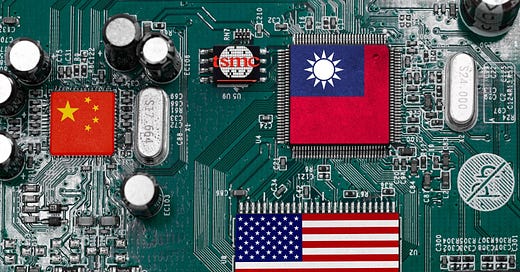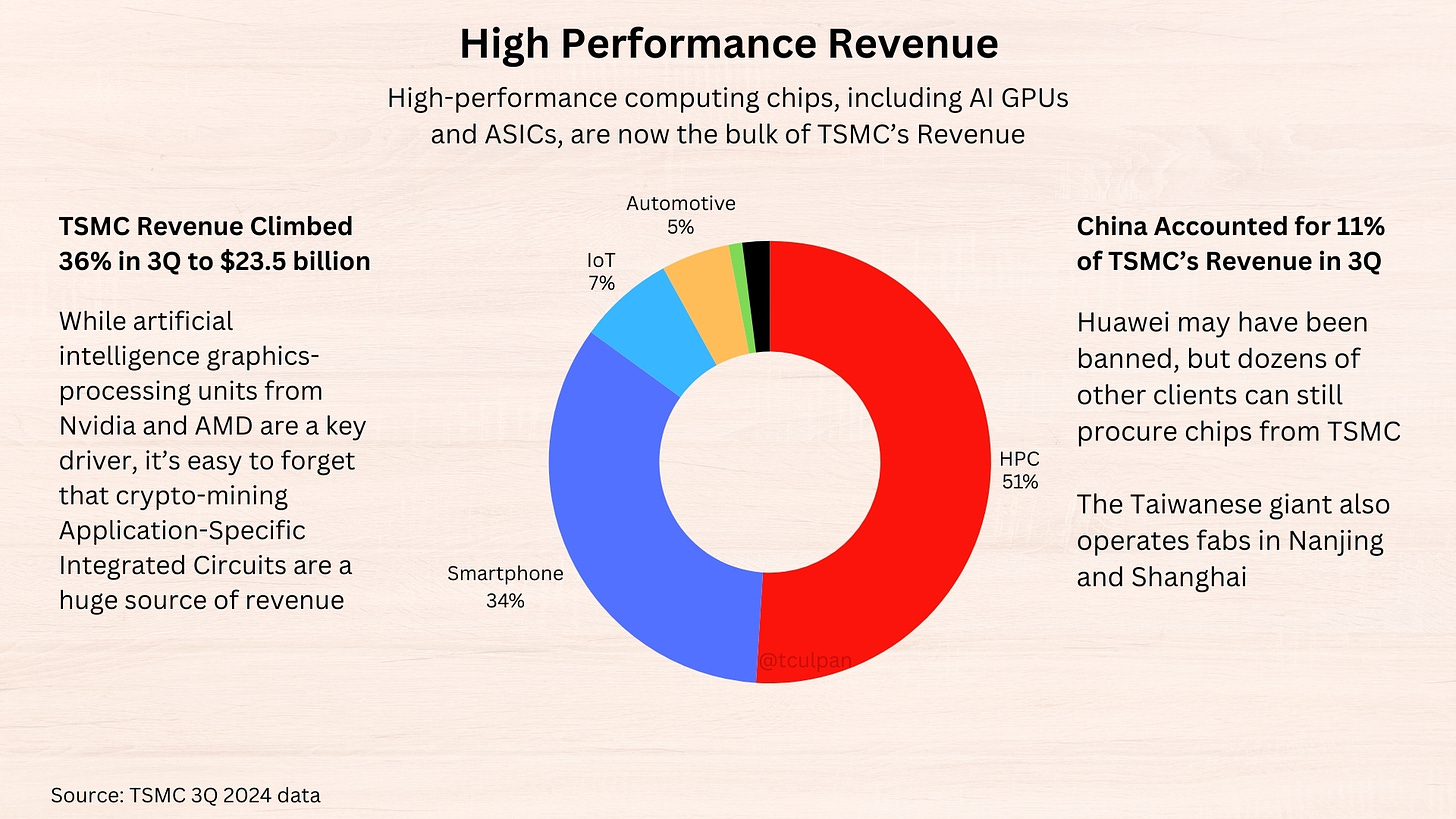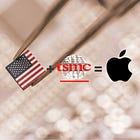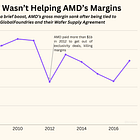TSMC Planned to Make Bitmain Chips in the US
[Exclusive] The Chinese company's ASICs were lined up for TSMC's Arizona fab. Then the Taiwanese giant changed its mind
Good Evening from Taipei,
TSMC made plans to commence manufacturing of ASICs for Chinese chip designer Bitmain in Arizona by early next year, my sources tell me. This past Summer, management was even in the advanced stages of pre-production for the Beijing-based customer, I am told.
At the time, Apple had already been locked in as the first customer for the new US fab. As I reported last month, the iPhone maker’s A16 SoC is now in production. It’s even tracking ahead of schedule and may be out the door by year end.
Bitmain could have been next.
Photolithography masks, which carry the pattern for making chips, had even been sent to Arizona which marks a crucial step in the pre-production phase. In the end, the plan was nixed and, according to my sources, the idea hasn’t been raised again.
A TSMC spokesperson declined to comment on Monday.
AMD has since been slated for mid-2025, I reported earlier this month, making it the first to procure high-performance computing chips in Arizona, and likely the second client for the new facility.
Had the Bitmain plan proceeded, it would have meant that a Chinese firm would be procuring high-performance application-specific integrated circuits (ASICs) at a US federally funded factory. TSMC is the recipient of $6.6 billion in grants from the US government under the CHIPS Act.
To the best of my knowledge, the most senior levels of management at TSMC were not initially aware of the plans. That’s not unusual. The C-suite isn’t necessarily involved in signing off each of hundreds of clients and thousands of products across more than a dozen factories.
Bitmain has not been sanctioned nor added to the US Entity List. But the company was investigated by Taiwanese prosecutors three years ago for allegedly poaching talent. In that case, Bitmain was accused of setting up two front companies in Taiwan, called WiseCore and IC-Link, for the purpose of designing AI chips. Prosecution was deferred.
More recently, Bitmain has been connected to Huawei. The Chinese electronics giant is on the Entity List, a compendium of companies Washington seeks to sanction or hobble because of their threat to US national security. Huawei and more than 100 affiliates were added to The List in 2019, with further tightening of restrictions effectively cutting it off from accessing TSMC’s manufacturing facilities.
Bitmain became famous for its Bitcoin-mining chips, and for a while was among TSMC’s most-important clients — it was a huge buyer of leading-edge capacity. Around five years ago it started to pivot toward AI chips, which are remarkably similar to Bitcoin chips because both are deployed for massive number-crunching. During this expansion Bitmain set up a number of affiliates, one of which is called Sophgo.
For a great rundown of the Bitmain saga, including its run-in with Taiwan authorities, the internal catfight between its co-founders, and the various entities that exist, I highly recommend Chiang Min-yen’s “The Remote Poaching Model” published by the Research Institute for Democracy, Society, and Emerging Technology.
Sophgo was named over the weekend by both The Information and Reuters as the front company used to placed orders of AI chips with TSMC that are alleged to look extraordinarily similar to Huawei’s Ascend 910B processors (also badged “HiSilicon,” an affiliate of Huawei). Taiwan’s Liberty Times reported that TSMC may even get to keep the advance payments, which could number in the hundreds of millions of dollars.
The allegations stem from a report by TechInsights which, according to its teardown, shows the 910B is made by TSMC using the foundry’s 7nm process. Sophgo denied the connection. According to a statement from the company, published subsequent to those reports, a US Commerce Department investigation into Huawei isn’t related to Sophgo, and Sophgo “has never been engaged in any direct or indirect business relationship with Huawei.”
There’s a lot of allegations being thrown around, often by people with little understanding of what’s actually being alleged.
But it’s also clear that TSMC was pretty tone deaf in even considering producing Bitmain chips at its shiny new US-funded factory in Arizona.
Given that Arizona is producing at the 5-nanometer node, these chips would utilize more-advanced production technology than that supposedly used for the 910B. However, Bitmain has already been getting access to 5,4 & 3nm nodes in Taiwan, so there’s no technological advantage to be gained from the US factory. As is the case for Apple and AMD, getting product from Arizona is largely symbolic.
From a legal point of view, there’s probably nothing wrong with doing this. Bitmain was accused of poaching talent in Taiwan, but its front companies got off. And the company hasn’t been sanctioned by the US, so there’s no breach there, either.
As for the supposed Bitmain-Sophgo-Huawei link, well, that can be spun anyway you like. I am not dismissing this connection, but there’s also no reason to be surprised. Most Chinese chip and tech companies are brethren through one common link — the Chinese government.
A few years ago, in another life, I wrote that TSMC is going to have to choose sides. It chose the US, which was a wise choice — not just politically, but financially. But that means the company must understand that it faces landmines in even considering taking on Chinese clients. It shouldn’t wait for a letter from the US Commerce Department to know what’s the smart move.
Thanks for reading.
Articles You May Have Missed:












Market size
Just curious: why was it the wise move to chose the US financially